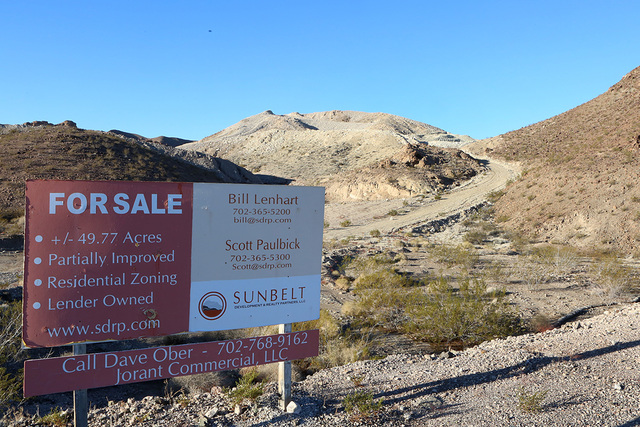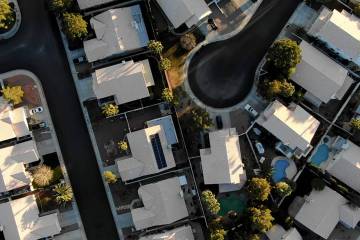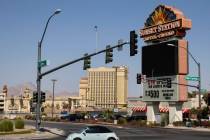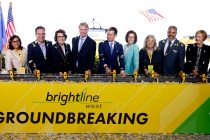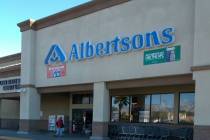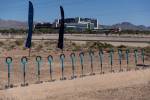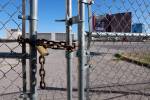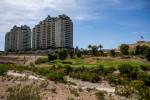Las Vegas Paving snaps up property at Lake Las Vegas
A big Southern Nevada contractor and landowner has snapped up property at Lake Las Vegas, the latest chapter for hilly terrain whose volatile history fits well with its community.
Las Vegas Paving Corp. bought around 50 acres of land in the southeast area of the Henderson community for $1.5 million. The sale closed Jan. 12, Clark County records show.
It’s unclear what the company plans to do with the site, and people familiar with the property say it wouldn’t be easy to develop a project there. At the very least, the new owners paid a fraction of what other investors are spending for land in the Las Vegas Valley nowadays.
Founded in 1958, Las Vegas Paving makes asphalt for streets and highways and builds airport runways, among other things. It’s the busiest road builder and heavy construction company in Nevada, according to Engineering News-Record, a trade publication.
Outside Lake Las Vegas, the company and its founder, Bob Mendenhall, also own more than 3,000 acres of vacant industrial land in Clark County, mostly at the isolated Apex Industrial Park in North Las Vegas, property records show. It seems most of its land at Apex is mountain or hilly terrain.
After the Review-Journal called Las Vegas Paving’s offices this week, the woman who had answered said the company does not comment on its land holdings.
“That’s all I was told to tell you,” she said.
A representative for the seller, real estate investment firm Colony NorthStar – until recently known as Colony Capital – did not return a call seeking comment.
FOR SALE FOR ‘A WHILE’
The land was partially developed for a bubble-era subdivision that didn’t produce a single house. Listing broker Michael Stuart of Colliers International said he had been trying to sell it for “a while” – brokers from other firms had tried to unload the property as well – and that he didn’t receive much interest.
Stuart noted that its tangled past includes fractured ownership and that there is limited access to the land and no utilities, raising the costs of a potential project.
A marketing brochure by Colliers says the asking price was $3.2 million – more than double what it sold for – and that the owners were “motivated to sell.”
Las Vegas Paving is no stranger to the property – it performed contracting work in that area of Lake Las Vegas last decade, court records show – and paid about $30,000 per acre. Throughout Southern Nevada, land investors paid an average of around $135,000 per acre last year through the third quarter, according to Colliers data.
The 3,600-acre Lake Las Vegas community, off Lake Mead Parkway east of Boulder Highway, has golfing, mansions, luxury hotels and a 320-acre man-made lake. It was one of the hardest-hit projects in one of the hardest-hit regions of the country during the recession, with plunging tourism, soaring foreclosures and shuttered golf courses that turned brown.
The project has been slowly getting back on its feet under billionaire John Paulson, a New York hedge-fund operator, who acquired about 1,000 acres there after the market crashed. But the community is far from fully healed – the retail district, for instance, is laced with vacancies and gets only a trickle of people walking around at times.
BIG PLANS, BIG PROBLEMS
Tracking the exact history of Las Vegas Paving’s property and surrounding land is complicated by the area’s changing parcel numbers. But one thing seems clear: the site mirrored Southern Nevada’s boom and bust.
The now-defunct Engle Homes planned to buy a few hundred acres there and build hundreds of homes, said Rick Hildreth, who worked on the deal as head of land acquisitions at Engle. He said the company planned to buy the land in two portions, for around $80 million total, and that he worked on the acquisition with developer and land banker John Cork, founder of Tempe, Arizona-based Coronado West.
Under a typical land-banking arrangement, Hildreth said, someone like Cork buys land for a homebuilder and sells it in pieces to the company. In theory, the banker books a profit on those sales, and the builder doesn’t have to spend big amounts upfront.
Cork acquired land at Lake Las Vegas – apparently the first portion of Engle’s project – in fall 2005 for $40.5 million, property and court records show. But the project eventually stalled, and litigation ensued.
The sellers claimed in court papers in spring 2007 that Engle failed to close on the second portion of the $81 million deal. Las Vegas Paving filed a lawsuit in early 2008, saying it was owed about $1.3 million for various work in that area of Lake Las Vegas. And a Cork-owned entity sued Community Bank of Nevada in fall 2008, alleging the bank had bailed on advancing more loan proceeds for Engle’s housing development.
A heavy real estate lender, Community Bank of Nevada collapsed in summer 2009 as the economy spiraled. The Federal Deposit Insurance Corp., acting as the bank’s receiver, foreclosed on what’s now Las Vegas Paving’s property in spring 2010 and sold it months later to Colony, county records indicate.
BANKRUPTCY FILINGS
Meanwhile, Engle Homes’ parent company, Florida-based Tousa Inc., filed for bankruptcy in early 2008, and Cork filed for bankruptcy in late 2011, court records show.
Cork did not respond to requests for comment this week.
Hildreth, now a broker with Land Advisors Organization in Las Vegas, said the project would have been “spectacular” – investors envisioned selling a mix of homes, from lower-priced starters to luxury estates up the mountain.
But ultimately, the plans were derailed with the economy, like countless other projects from the easy-money boom years.
“We saw the world way differently back then,” he said.
Contact Eli Segall at 702-383-0342 or esegall@reviewjournal.com. On Twitter at @eli_segall



